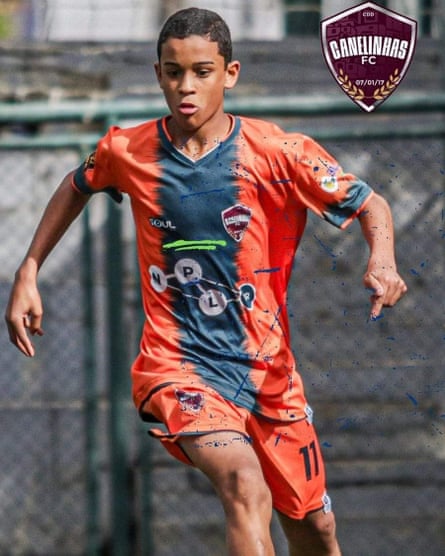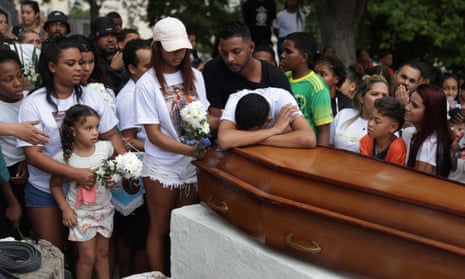Those who knew Thiago Menezes Flausino described him as a boy with dreams. These were brutally shattered by several police bullets this week, when the 13-year-old became one of the latest victims of state violence in a Rio de Janeiro favela.
“He dreamed of becoming a professional footballer. He’d passed tryouts for a bigger team and was going to start playing on the day he was killed,” said his aunt Nataly Bezerra Flausino, standing outside the evangelical church where her nephew’s funeral was being held on Tuesday, mere months after his baptism.
Thiago was the ninth child aged under 14 to die in a shooting this year in Rio, according to the human rights NGO Rio de Paz. A tenth has died since. Most are hit by stray bullets, often during the police raids that routinely paralyse Rio’s low-income communities, such as the one that left 10 dead earlier this month.
But it was no stray bullet that killed Thiago in the small hours of Monday morning on the main thoroughfare that cuts through Cidade de Deus (City of God), the favela made globally famous by Fernando Meirelles’s 2002 film. His family say he was executed by military police officers, his only crime being a young Black boy riding on the back of a motorbike in a favela.
“My nephew was hit with more than five gunshots. He’s 13, all small and skinny. The bullets went right through his body,” sobbed Flausino.
Deaths like Thiago’s are sadly commonplace in a country where police killed more than 6,400 people last year, 83% of them Black. Less than 24 hours earlier, another Black youth died near a Rio favela at the hands of police who chose to shoot first and ask questions later.
Still, Thiago’s age has sparked particular outcry. “The death of a 13-year-old adolescent by a state bullet is a grave sign that we have failed as a society,” tweeted Renata Souza, a leftwing lawmaker.

Thiago’s family, favela activists and famous artists have expressed outrage at the fact that police depicted the child as a drug trafficker carrying a gun, a narrative repeated by some people online.
“The state’s security forces need a way of legitimising these kinds of absurdities, so what do they do? They criminalise and tarnish the image of the person who was killed,” said João Luis Silva, Rio de Paz’s social coordinator.
Flausino expressed anger at the deep injustice of her family having to prove Thiago’s innocence amid their pain. “Those of us who are poor, who live in the favela, who are Black, we have to prove everything,” said the 30-year-old human resources analyst as mourners gathered around the small coffin decorated with football shirts and handwritten notes from friends.
“Thiago didn’t have time to be a gangster,” said Fábio Ferreira da Silva, 47, the coach at a favela football project where the aspiring athlete had trained since he was eight. “He was very talented, respectful, he listened when you spoke to him … an adorable child … he definitely had a future as a footballer.”
The local community’s respect and affection for the boy they nicknamed Thiaguinho (Little Thiago) was evident in the grief-stricken crowd that packed the church for his funeral. More than 200 people – many of them distraught teenagers wearing white T-shirts printed with their friend’s photo – then attended the burial at the nearby Pechincha cemetery, a sombre affair marked by calls for justice.
“The state is murderous … We just want justice, that those responsible pay for what they did to a child with dreams,” said Silvio César, 52, who runs a youth centre in Cidade de Deus.
Police and prosecutors are investigating the circumstances of the killing. Military police officers claim they were shot at first. Residents deny this, saying police simulated a gunfight, intimidated witnesses to keep them away from the scene of Thiago’s death, and tampered with footage from nearby security cameras.
Souza, the lawmaker, has urged authorities to apply the Ágatha Félix law, a piece of state legislation named after an eight-year-old who was shot in a favela in 2019 that aims to speed up the investigation of children’s homicides.
But accountability in cases of police violence is rare, said Cecília Olliveira, executive director of the violence-tracking group Fogo Cruzado. “These policemen, they are not prosecuted, they are not sentenced, they are not duly investigated, because [institutions] fail,” she said.
City of God residents are not backing down, and plan to continue campaigning to achieve justice for a teenager everyone remembers as happy, studious and sporty.
“It’s just fuel for our community, this loss of our player, of our friend, of our son,” said Silva, the coach. “We can’t bring Thiago back. But we want to know, will he be the last one, or are there more Thiagos ahead? The community wants answers. We can’t take it any more.”
